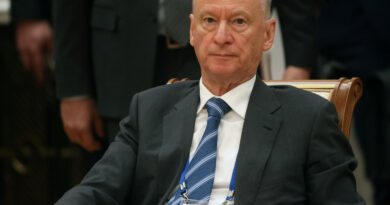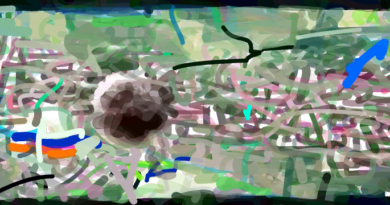The West’s Fanaticism Over Blaming ‘Evil’ Putin Misses the Point—and an Opportunity for a Lasting Peace

The old long war in Afghanistan has barely ended and already there is a new one, this time in Europe. Most governments, the media, and the United Nations General Assembly reached a consensus quickly: the contemptible aggressor is Vladimir Putin. Public opinion strongly supports Ukraine. Large demonstrations form almost daily to demand peace. The Global South, however, with much of the world’s population, is not eager to participate in sanctions against Russia. China, India, Brazil, Bangladesh, Pakistan, Indonesia, and much of Latin America will not join in. Several countries rely on grain imports from Ukraine and Russia, and worry about major shortages caused by supply chain disruptions. The efforts for peace are commendable—but could they fizzle out too soon? Is this well-meaning but perhaps myopic movement the best we can hope for, or could we aim for something better for Ukraine, for Russians, and for the rest of the planet if we step outside the framework of the Western neoliberal capitalist war machine?
During the early days of the invasion, Western media showed brave Ukrainians training for the 2022 war against the Russian Army with wooden replica rifles. While they may be brave, it is impossible to ignore that they started this fight with insufficient equipment against an army that well outnumbered them. Furthermore, according to the international law of armed conflict, civilians who take part in hostilities lose certain legal protections and can become targets. That is already happening before our eyes on TV. Even if the civilian resistance is partially successful, it will suffer too many casualties. Is this what freedom supporters want for the Ukrainians who have already borne much during their last 100 years of history? It is easy to fight proxy wars when you sit safely at home and have no skin in the game. Give them weapons, sure, so they can really fight! If they are heroic and resilient, this may turn into a nasty, longer-term struggle, house ruin to house ruin, street by street. It will brutalize the population, devastate the country, and damage the environment evermore. It could also evolve into a quagmire with fallout more devastating than the already-awful tragedy of the U.S. invasion of Afghanistan. Incremental escalation also increases the risks for the use of tactical nuclear weapons.
And if the Ukrainians, despite their cheerleaders in the West, do not last long against a mighty military machine, then the coldly calculated net sum may just be an appalling waste of life and great sad futility that simultaneously triggered a big wave of bereaved women and children as refugees (with existing inequalities of race and nationality reflected there too). According to the Costs of War Project at Brown University’s Watson Institute, “38 million people have been displaced by the post-9/11 wars in Afghanistan, Pakistan, Iraq, Syria, Libya, Yemen, Somalia, and the Philippines.” Are the architects of NATO expansion ready to accept responsibility for their deeds and take in huge numbers of Ukrainian refugees?
I am not drawn to these possibilities. It is eerie and disturbing to witness how fast people become nearly fanatical in blaming the newest villain or the momentary evil empire. It begins with Putin, proceeds to Russian vodka, and will end where? It also creates some type of love-of-freedom euphoria. But will it last when the time comes to face the costs of this catastrophe?
In any event, it may have been an unwise and rash move to invite newly independent countries of the former Warsaw Pact to become members of NATO. What’s the hurry? For those who lived under Soviet control in Eastern Europe, it will take more than the three decades that have passed so far to reduce the negative stockpiles of experience, emotion, resentment, and revanchist impulse. Providing incentives for building a healthy economy and showing the road to EU membership were good options, but using former Soviet-controlled countries to become a bulwark against the Russian bear was not. Finland, which again ranks as number one in the 2021 World Happiness Report, is a small successful country that has chosen a different approach while living next door to Russia. The bear is dangerous when rejected, provoked, and angered. So where was the strategic empathy? Russia knows that it is unloved in these former satellite countries. It understands that it is nearly encircled and almost under siege by the push against its borders and by efforts to pull even Ukraine into NATO. And so perhaps it is understandable that it has rolled itself up like a hedgehog facing peril, showing its prickly exterior. After all, it has been invaded repeatedly but has not done much westward invading itself, except when chasing intruders out. Yet the chance to loosen things up slowly after the Soviet era while supporting more democratic developments was squandered. The Russian people didn’t get much of a break.
There are Atlanticists who will not accept that Russia is part of Europe. But like it or not, it was, and is, and will be—at least up to the Urals. Denial will only maintain a festering trench of potential conflict, and it could drive that vast country into the “briar patch” of China’s Xi Jinping, as David P. Goldman recently put it in Asia Times. The political and economic leaders of the Western alliance who are used to things going their way are in need of a reality check; the rest of the world is no longer willing to tolerate their irrational addiction to the confrontational and rapacious behavior that is misnamed foreign policy. No, the end of the Cold War wasn’t the “end of history.” And as Andrew Bacevich wrote in the Boston Globe, “The argument made by several recent U.S. administrations that NATO expansion does not pose a threat to Russian security doesn’t pass the sniff test. It assumes that U.S. attitudes toward Russia are benign. They are not and haven’t been for decades.”
This is the key: passing the sniff test. A change in attitude is required. That is not a weakness. It is good sense and the positive will to help life and the living. The last thing the U.S., Europe, and the abused planet need is more obscene destruction, new stockpiles of mental contamination, and, as the UN reports, the additional 10 million fleeing and internally displaced Ukrainian people so far. It adds insult to injury. And the only participants you will hear laughing are the sanction-free oil and gas producers/promoters on their way to the bank. In addition, as it has repeatedly occurred, the dominant drumbeat of war drowns out much of diverse public communication. Such a one-dimensional mainstream narrative contributes nothing to de-escalation—it does the opposite. President Biden’s recent State of the Union speech barely touched on the existential threat of the climate crisis.
Yes, it is fantastic to see how the majority of the international community stands with Ukraine. But a Woodstock-like freedom frenzy will be too short in duration for the making of peace. That requires cool heads, warm hearts, at least half an ounce of humility, and the firm determination to stop the insanity of this preventable war.
*
Note to readers: Please click the share buttons above or below. Follow us on Instagram, @globalresearch_crg and Twitter at @crglobalization. Feel free to repost and share widely Global Research articles.
This article was produced by Globetrotter.
Erika Schelby is the author of Looking for Humboldt and Searching for German Footprints in New Mexico and Beyond (Lava Gate Press, 2017) and Liberating the Future from the Past? Liberating the Past from the Future?(Lava Gate Press, 2013), which was shortlisted for the International Essay Prize Contest by the Berlin-based cultural magazine Lettre International. Schelby lives in New Mexico.
Featured image is from Stock File
This article has been archived for your research. The original version from Global Research can be found here.


